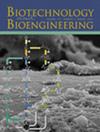鲁棒动态代谢控制的强化学习
IF 3.6
2区 生物学
Q2 BIOTECHNOLOGY & APPLIED MICROBIOLOGY
引用次数: 0
摘要
动态代谢控制允许实时调节关键代谢通量,增强生物过程的灵活性并扩大可用的优化自由度。例如,这可以通过有针对性地调节代谢酶的表达来实现。然而,确定最优的动态控制策略是具有挑战性的,因为通常是高维的解决方案空间,需要管理代谢负担和诱导酶表达引起的细胞毒性效应。随机动力学降低了生物过程的可重复性,使任务进一步复杂化。我们提出了一个强化学习框架,通过允许代理(控制器)与代理动态模型交互来获得最优策略。为了提高鲁棒性,我们应用了域随机化,使控制器能够跨越不确定性进行泛化。当转移到实验系统时,智能体原则上可以继续微调策略。我们的框架为传统的基于模型的控制(如模型预测控制)提供了一种替代方案,这需要对决策变量进行模型微分;通常不适用于复杂的随机、非线性、刚性和分段定义的动力学。相反,我们的方法依赖于模型的前向集成,从而简化了任务。我们在两个大肠杆菌生物过程中展示了该框架:脂肪酸合成的乙酰辅酶a羧化酶和乳酸合成的腺苷三磷酸酶的动态控制。本文章由计算机程序翻译,如有差异,请以英文原文为准。
Reinforcement Learning for Robust Dynamic Metabolic Control
Dynamic metabolic control allows key metabolic fluxes to be modulated in real time, enhancing bioprocess flexibility and expanding available optimization degrees of freedom. This is achieved, for example, via targeted modulation of metabolic enzyme expression. However, identifying optimal dynamic control policies is challenging due to the generally high‐dimensional solution space and the need to manage metabolic burden and cytotoxic effects arising from inducible enzyme expression. The task is further complicated by stochastic dynamics, which reduce bioprocess reproducibility. We propose a reinforcement learning framework to derive optimal policies by allowing an agent (the controller) to interact with a surrogate dynamic model. To promote robustness, we apply domain randomization, enabling the controller to generalize across uncertainties. When transferred to an experimental system, the agent can in principle continue fine‐tuning the policy. Our framework provides an alternative to conventional model‐based control such as model predictive control, which requires model differentiation with respect to decision variables; often impractical for complex stochastic, nonlinear, stiff, and piecewise‐defined dynamics. In contrast, our approach relies on forward integration of the model, thereby simplifying the task. We demonstrate the framework in two Escherichia coli bioprocesses: dynamic control of acetyl‐CoA carboxylase for fatty‐acid synthesis and of adenosine triphosphatase for lactate synthesis.
求助全文
通过发布文献求助,成功后即可免费获取论文全文。
去求助
来源期刊

Biotechnology and Bioengineering
工程技术-生物工程与应用微生物
CiteScore
7.90
自引率
5.30%
发文量
280
审稿时长
2.1 months
期刊介绍:
Biotechnology & Bioengineering publishes Perspectives, Articles, Reviews, Mini-Reviews, and Communications to the Editor that embrace all aspects of biotechnology. These include:
-Enzyme systems and their applications, including enzyme reactors, purification, and applied aspects of protein engineering
-Animal-cell biotechnology, including media development
-Applied aspects of cellular physiology, metabolism, and energetics
-Biocatalysis and applied enzymology, including enzyme reactors, protein engineering, and nanobiotechnology
-Biothermodynamics
-Biofuels, including biomass and renewable resource engineering
-Biomaterials, including delivery systems and materials for tissue engineering
-Bioprocess engineering, including kinetics and modeling of biological systems, transport phenomena in bioreactors, bioreactor design, monitoring, and control
-Biosensors and instrumentation
-Computational and systems biology, including bioinformatics and genomic/proteomic studies
-Environmental biotechnology, including biofilms, algal systems, and bioremediation
-Metabolic and cellular engineering
-Plant-cell biotechnology
-Spectroscopic and other analytical techniques for biotechnological applications
-Synthetic biology
-Tissue engineering, stem-cell bioengineering, regenerative medicine, gene therapy and delivery systems
The editors will consider papers for publication based on novelty, their immediate or future impact on biotechnological processes, and their contribution to the advancement of biochemical engineering science. Submission of papers dealing with routine aspects of bioprocessing, description of established equipment, and routine applications of established methodologies (e.g., control strategies, modeling, experimental methods) is discouraged. Theoretical papers will be judged based on the novelty of the approach and their potential impact, or on their novel capability to predict and elucidate experimental observations.
 求助内容:
求助内容: 应助结果提醒方式:
应助结果提醒方式:


